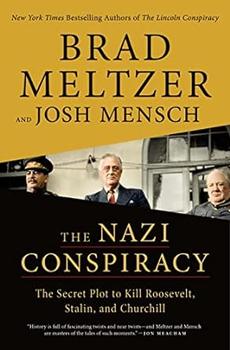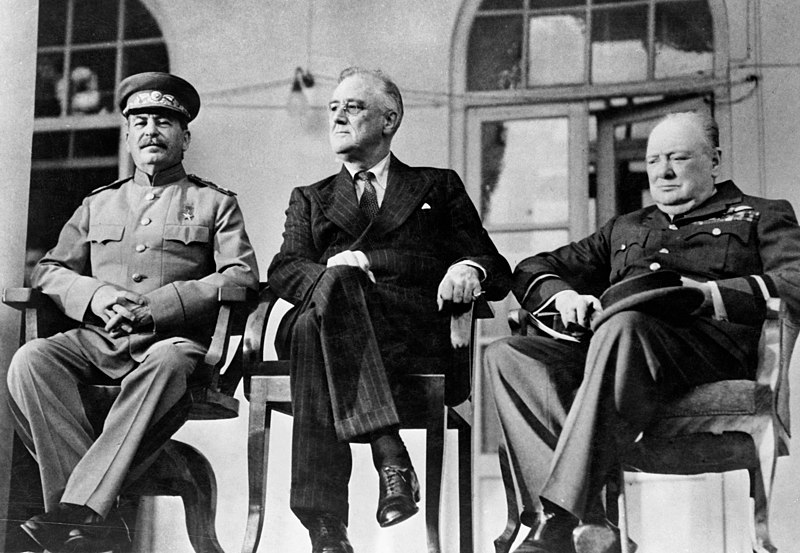Summary | Excerpt | Reading Guide | Discuss | Reviews | Beyond the Book | Read-Alikes | Genres & Themes | Author Bio

The Secret Plot to Kill Roosevelt, Stalin, and Churchill
by Brad Meltzer, Josh MenschThis article relates to The Nazi Conspiracy
 The Nazi Conspiracy by Brad Meltzer and Josh Mensch centers on an alleged plot by the Germans during World War II to kill or kidnap the three major world leaders representing the Allied powers: American president Franklin D. Roosevelt, British prime minister Winston Churchill and premier of the Soviet Union Joseph Stalin.
The Nazi Conspiracy by Brad Meltzer and Josh Mensch centers on an alleged plot by the Germans during World War II to kill or kidnap the three major world leaders representing the Allied powers: American president Franklin D. Roosevelt, British prime minister Winston Churchill and premier of the Soviet Union Joseph Stalin.
The plan, known as Operation Long Jump (Operation Rösselsprung in German) was meant to be carried out during the Tehran Conference, also known as Eureka, when the three met secretly in Iran in November of 1943 to discuss the particulars of winning the war. The meeting's location was chosen mainly for its strategic advantages. At the time, Iran was occupied by both the Soviets and Britain, and it served as a shipping route between the United States and USSR. Though Iran outwardly showed support for the Germans, it had technically remained neutral in the war, and while German spy activity was prevalent in Tehran, the Soviets had bolstered their own intelligence in the area.
According to a Warfare History Network article by Mason B. Webb, German intelligence became aware of the Tehran meeting in October of 1943, and a plan was concocted to take advantage of the situation and assassinate the three leaders. The mission was headed by Otto Skorzeny, an Austrian SS officer who had been responsible for the rescue of Mussolini after his capture by the Allies earlier that year. However, Soviet intelligence soon learned of this plan, supposedly through one of their own who disguised himself as a German and went behind enemy lines, and were able to successfully thwart the attempt, arresting a group of Nazi radio operators involved in the plot as they arrived in Tehran. Webb points out that much of this information is contested, partly because of its dependence on Soviet sources that some consider unreliable. Arguments have been presented that there was never a conspiracy at all.
In their book, Meltzer and Mensch acknowledge these challenges as well, but present evidence for why they think a plot existed. They additionally take a broad view of the factors surrounding the conspiracy, using both their own in-depth research and historical context to set the scene for their theories of what really happened. "To learn and write about our particular story," Meltzer said, "[W]e had to comb through British and U.S. intelligence files, search for material in German libraries, and dig into obscure Russian-language sources. By the end, we felt we had a pretty good understanding of what happened and what didn't, although some mysteries and questions certainly remain."
Regardless of what happened, Roosevelt, Stalin and Churchill survived their meeting in Tehran and took the opportunity to discuss strategies against Germany and Japan, which would lead to military actions such as Operation Overlord (aka the Battle of Normandy) — the invasion of Nazi-occupied Northern France — and the end of the war. Shortly after the conference, Roosevelt disclosed some of the details of the secret gathering and mentioned that he had learned from Soviet forces that his life had been in danger, remarking casually, "I suppose it would make a pretty good haul if they could get all three of us going through the streets."
In talking about the process of writing the book, Meltzer has stressed how much the eventual outcome of WWII was not guaranteed, both because of the possibility of a successful Nazi assassination plot and because the Allied leaders clashed in their views, making it difficult for them to work together. "I mean, we love to tell the story of Normandy and how we stormed the beaches and the day was saved," he said, "But, my God, it almost didn't happen… And you just realize how easily it could have gone the other way, especially if the plot to kill them had succeeded."
Left to right: Joseph Stalin, Franklin D. Roosevelt and Winston Churchill at the Tehran Conference, via Library of Congress
Filed under People, Eras & Events
![]() This "beyond the book article" relates to The Nazi Conspiracy. It originally ran in January 2023 and has been updated for the
January 2024 paperback edition.
Go to magazine.
This "beyond the book article" relates to The Nazi Conspiracy. It originally ran in January 2023 and has been updated for the
January 2024 paperback edition.
Go to magazine.
Your guide toexceptional books
BookBrowse seeks out and recommends the best in contemporary fiction and nonfiction—books that not only engage and entertain but also deepen our understanding of ourselves and the world around us.